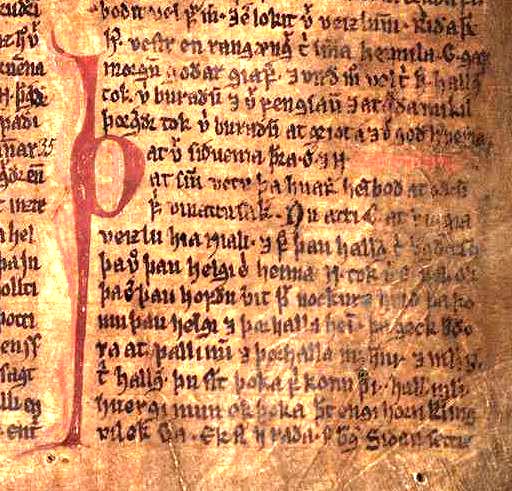|
Icelandic culture has its roots in Norse traditions. Icelandic literature is popular, in particular the sagas and eddas that were written during the High and Late Middle Ages. Centuries of isolation have helped to insulate the country's Nordic culture from external influence; a prominent example is the preservation of the Icelandic language, which remains the closest to Old Norse.
Literature
* Iceland's best-known classical works of literature are the Icelanders' sagas, prose epics set in Iceland's age of settlement. The most famous of these include Njáls saga, about an epic blood feud, and Grænlendinga saga and Eiríks saga, describing the discovery and settlement of Greenland and Vinland (modern Newfoundland).
* Icelanders are avid consumers of literature, with the highest number of bookstores per capita in the world. |

Ancient sagas are an important part of
Icelandic heritage |
Film
* Much of the 2002 James Bond movie Die Another Day is set in Iceland.
Food and drink
* Much of Iceland's cuisine is based on fish, lamb, and dairy products, with little to no use of herbs or spices. Due to the island's climate, fruits and vegetables were not often a component in traditional food. The main meal of the day for most Icelanders is dinner, which usually involves fish or lamb as the main course. Seafood is central to most Icelandic cooking, particularly cod and haddock, smoked, pickled, boiled, or dried.
* A traditional strong drink is Brennivín (literally "burnt wine"), which is similar to Scandinavian akvavit, and sometimes known as svarti dauði ("Black Death"). It is a type of vodka made from distilled potatoes and flavoured with either caraway seeds or angelica.
People's names
Children take the first name of a parent. For example, a man named Jón Einarsson has a son named Ólafur. Ólafur’s last name will not be Einarsson like his father’s. It will become Jónsson after his father's first name. It is the same for daughters. Jón Einarsson's daughter Sigríður’s last name would not be Einarsson but Jónsdóttir. Again, the name literally means "Jón’s daughter". The child can also be named after the mother. It is correct to use the first name speaking to a person; also the telephone directory and other lists are alphabetical by first name not surname.
|

